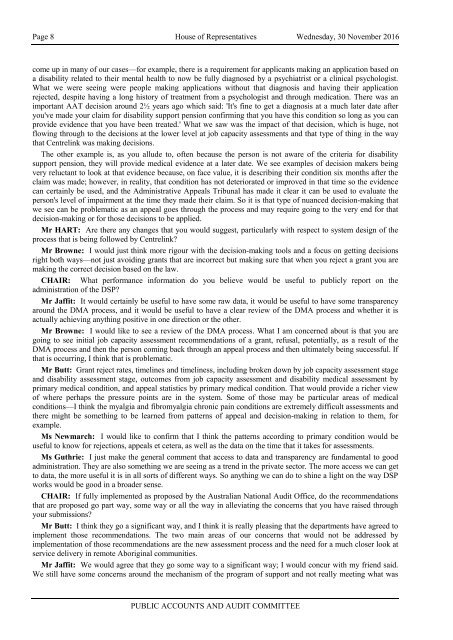Proof Committee Hansard
2hbqb7M
2hbqb7M
You also want an ePaper? Increase the reach of your titles
YUMPU automatically turns print PDFs into web optimized ePapers that Google loves.
Page 8 House of Representatives Wednesday, 30 November 2016<br />
come up in many of our cases—for example, there is a requirement for applicants making an application based on<br />
a disability related to their mental health to now be fully diagnosed by a psychiatrist or a clinical psychologist.<br />
What we were seeing were people making applications without that diagnosis and having their application<br />
rejected, despite having a long history of treatment from a psychologist and through medication. There was an<br />
important AAT decision around 2½ years ago which said: 'It's fine to get a diagnosis at a much later date after<br />
you've made your claim for disability support pension confirming that you have this condition so long as you can<br />
provide evidence that you have been treated.' What we saw was the impact of that decision, which is huge, not<br />
flowing through to the decisions at the lower level at job capacity assessments and that type of thing in the way<br />
that Centrelink was making decisions.<br />
The other example is, as you allude to, often because the person is not aware of the criteria for disability<br />
support pension, they will provide medical evidence at a later date. We see examples of decision makers being<br />
very reluctant to look at that evidence because, on face value, it is describing their condition six months after the<br />
claim was made; however, in reality, that condition has not deteriorated or improved in that time so the evidence<br />
can certainly be used, and the Administrative Appeals Tribunal has made it clear it can be used to evaluate the<br />
person's level of impairment at the time they made their claim. So it is that type of nuanced decision-making that<br />
we see can be problematic as an appeal goes through the process and may require going to the very end for that<br />
decision-making or for those decisions to be applied.<br />
Mr HART: Are there any changes that you would suggest, particularly with respect to system design of the<br />
process that is being followed by Centrelink?<br />
Mr Browne: I would just think more rigour with the decision-making tools and a focus on getting decisions<br />
right both ways—not just avoiding grants that are incorrect but making sure that when you reject a grant you are<br />
making the correct decision based on the law.<br />
CHAIR: What performance information do you believe would be useful to publicly report on the<br />
administration of the DSP?<br />
Mr Jaffit: It would certainly be useful to have some raw data, it would be useful to have some transparency<br />
around the DMA process, and it would be useful to have a clear review of the DMA process and whether it is<br />
actually achieving anything positive in one direction or the other.<br />
Mr Browne: I would like to see a review of the DMA process. What I am concerned about is that you are<br />
going to see initial job capacity assessment recommendations of a grant, refusal, potentially, as a result of the<br />
DMA process and then the person coming back through an appeal process and then ultimately being successful. If<br />
that is occurring, I think that is problematic.<br />
Mr Butt: Grant reject rates, timelines and timeliness, including broken down by job capacity assessment stage<br />
and disability assessment stage, outcomes from job capacity assessment and disability medical assessment by<br />
primary medical condition, and appeal statistics by primary medical condition. That would provide a richer view<br />
of where perhaps the pressure points are in the system. Some of those may be particular areas of medical<br />
conditions—I think the myalgia and fibromyalgia chronic pain conditions are extremely difficult assessments and<br />
there might be something to be learned from patterns of appeal and decision-making in relation to them, for<br />
example.<br />
Ms Newmarch: I would like to confirm that I think the patterns according to primary condition would be<br />
useful to know for rejections, appeals et cetera, as well as the data on the time that it takes for assessments.<br />
Ms Guthrie: I just make the general comment that access to data and transparency are fundamental to good<br />
administration. They are also something we are seeing as a trend in the private sector. The more access we can get<br />
to data, the more useful it is in all sorts of different ways. So anything we can do to shine a light on the way DSP<br />
works would be good in a broader sense.<br />
CHAIR: If fully implemented as proposed by the Australian National Audit Office, do the recommendations<br />
that are proposed go part way, some way or all the way in alleviating the concerns that you have raised through<br />
your submissions?<br />
Mr Butt: I think they go a significant way, and I think it is really pleasing that the departments have agreed to<br />
implement those recommendations. The two main areas of our concerns that would not be addressed by<br />
implementation of those recommendations are the new assessment process and the need for a much closer look at<br />
service delivery in remote Aboriginal communities.<br />
Mr Jaffit: We would agree that they go some way to a significant way; I would concur with my friend said.<br />
We still have some concerns around the mechanism of the program of support and not really meeting what was<br />
PUBLIC ACCOUNTS AND AUDIT COMMITTEE















